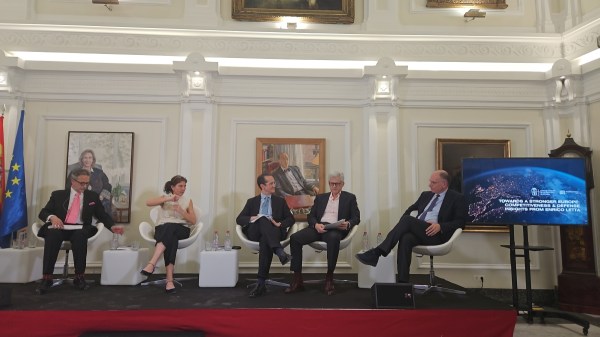 Fernando Menéndez
Fernando Menéndez
Within the framework of the sixth international Big Data Week conference organized by Synergic Partners in Madrid, which this week brought together a large number of experts from the Big Data sector, Philip Schönrock, Director of Cepei, presented Data República, a pioneering digital laboratory which acts as a vehicle for introducing citizens to the world of data, as well as enhancing decision-making capabilities as part of the UN’s 17 Sustainable Development Goals (SDGs).
One of the challenges associated with deploying the SDGs throughout the world involves obtaining, systematizing, opening and using data to implement and monitor them. Hence, governments, civil society, academia and the private sector are required to generate effective partnerships contributing to the collection and circulation of data to monitor the agenda but also to work together on the challenges that this entails.
“No country has 100% of the information required to measure the SDGs. On average, countries only have information to measures 66 goals, 39% of the total. The countries with the most information to measure the SDG indicators are chiefly in Latin America, middle-income countries and emerging countries. It is vital for the SDGs to be measured so that we can see which areas companies and public institutions should improve and focus on,” declared Cepei’s Director at the conference.
In the spirit of strengthening the data ecosystem for sustainable development, Data República was born in early 2017 as a result of the partnership between Cepei and Telefónica. The initial phase of the project was launched a year ago in Colombia, Mexico and Costa Rica and, in its second phase, it will be extended to other countries in the region such as Peru. In addition, conversation is taking place with actors in Africa to share the experiences of the platform and to explora the possibility of its implementation throughout the continent.
Data República is a collaborative platform whereby civil society, academia, the public sector, the private sector and multilateral agencies can contribute to building more solid data ecosystems at local, regional and global levels.
This cooperation must be structured around three axes: firstly, providing the Data República platform with as many data sets as possible which are relevant to the SDGs. Secondly, inviting the Latin American journalistic community to learn to create stories with data, and, finally, encouraging this community to create stories with data. Until now the platform has classified a total of 1,185 data sets in the three countries, of which 394 are from Mexico, 534 from Colombia and 255 from Costa Rica.
“We want data poets who can tell fresh and creative stories on datarepublica.org,” stated Philip Schönrock.
Do you want to form part of Data Republica? What can you do?
1) Donate your data
2) Circulate
3) Donate your time
4) Finance the project
If you want to take part or collaborate with the Data Republica initiative by donating your data, writing data-based stories or supporting the platform’s expansion, write an email to [email protected]. Today we can achieve a more susitainable world.










